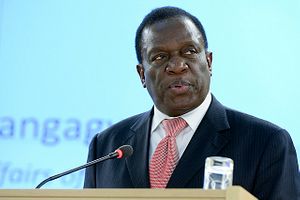On November 24, Zimbabwe’s new President Emmerson Mnangagwa took the oath of office in the capital, Harare. In response, Chinese President Xi Jinping sent him a congratulatory message on the same day.
According to Chinese foreign ministry, Xi said in the message that China and Zimbabwe are “good friends, partners and brothers.” He emphasized that the bilateral relations have withstood the test of time and changing international situation. Xi added that China values the traditional friendship with Zimbabwe and stands ready to strengthen all-round cooperation and advancing bilateral ties.
The timely message has made it clear to Zimbabwe as well as to the world that China is happy to maintain a close relationship with Zimbabwe no matter who takes office as president.
This is far from surprising. In fact, China actually expressed the exact position when the Zimbabwe’s crisis broke out two weeks ago. As soon as Zimbabwe’s military took control of the country, China’s foreign ministry declared China’s strong belief in Zimbabwe that the nation can “properly handle its internal affairs.”
The final result turned out to be the most ideal one from Beijing’s perspective.
On the one hand, Zimbabwe’s former President Robert Mugabe stepped down with considerable dignity. It saved not only Mugabe’s own face, but Beijing’s face as well. In this way, without ‘hurting the feeling of Zimbabwe’s people,’ Beijing can keep referring to Mugabe as “China’s old friend” and maintain China’s past decades-long close relations with Mugabe legitimized.
On November 22, when the information of Mugabe’s resignation spread to Beijing, China’s foreign ministry spokesperson Lu Kang commented on Mugabe in the following way during the regular press briefing:
[H]e has made historic contribution to Zimbabwe’s national independence and liberation, and he is an active advocate and promoter of the Pan-Africanism movement. He has long been committed to China-Zimbabwe and China-Africa friendship and made important contribution to China-Zimbabwe and China-Africa relations. China respects Mr. Mugabe’s decision to resign. He remains a good friend of the Chinese people.
On the other hand, the new president Mnangagwa has a decades-long history with China as well.
In the 1960s — when Zimbabwe was still in the colonial era and China was under Mao Zedong’s revolutionary leadership — Mnangagwa had trained in China and studied China’s Communist ideology in Beijing. Then, he went back to Zimbabwe and joined the Crocodile Group, a violent organization that resisted colonial rule. The Chinese government reportedly had supported the group with money and arms.
In addition, although China strongly denied this afterwards, there was a widespread rumor circulating that Mnangagwa had fled to China before the Zimbabwe’s military took over the power. The rumor itself displayed Mnangagwa’s special relations with Beijing. And this sort of special relationship can guarantee China’s interests in Zimbabwe intact after Mugabe’s withdrawal.
It also explained why Lu urged “other countries” — the Western countries to be specific — not to “intervene in Zimbabwe’s internal affairs,” when Mugabe resigned.
































